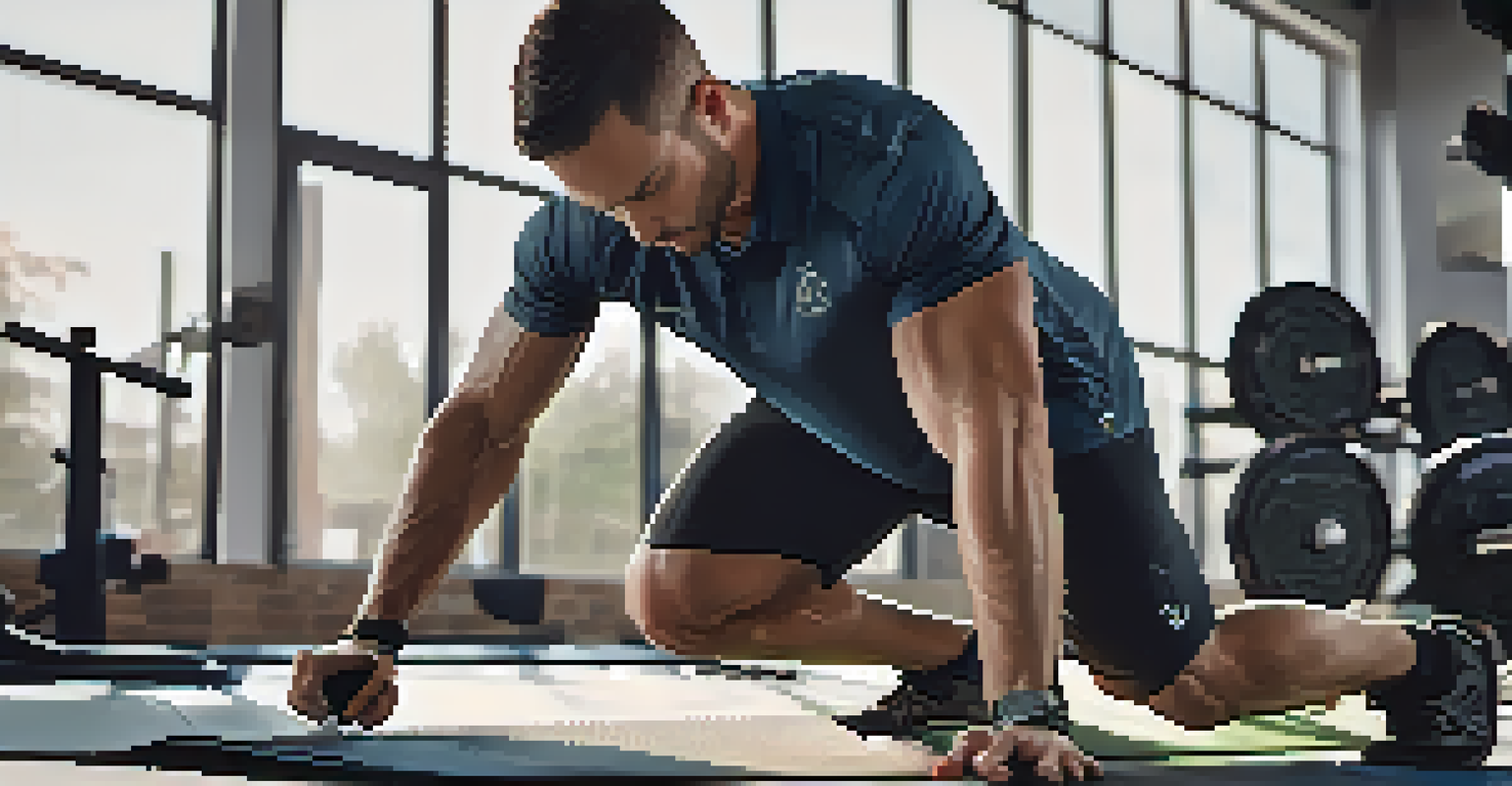The Role of Strength and Conditioning Coaches in Sports Rehab

Introduction to Strength and Conditioning Coaches
Strength and conditioning coaches play a crucial role in the world of sports, especially when it comes to rehabilitation. These professionals are trained to improve athletic performance through tailored exercise programs. They focus not just on building strength but also on enhancing flexibility, endurance, and overall physical resilience.
The difference between a successful person and others is not a lack of strength, not a lack of knowledge, but rather a lack in will.
In the context of sports rehab, these coaches are invaluable partners for athletes recovering from injuries. They assess an athlete's specific needs and design recovery programs that promote healing while also preparing the body for a safe return to play. This dual focus on recovery and performance is what sets them apart from traditional physical therapists.
By bridging the gap between rehabilitation and training, strength and conditioning coaches help athletes regain their confidence and physical capabilities. Their expertise is essential for ensuring that athletes not only recover but also improve their performance post-injury.
The Assessment Process in Rehabilitation
A key part of a strength and conditioning coach's role in rehab is conducting thorough assessments. This involves evaluating an athlete's injury history, current physical condition, and specific sport demands. Such assessments help in crafting personalized rehab programs that cater to individual needs.

For example, a football player recovering from a knee injury may require different exercises than a swimmer with a shoulder issue. By understanding the unique requirements of each sport, coaches can better prepare athletes for a successful return to their specific activities. This targeted approach minimizes the risk of re-injury.
Customized Rehab Programs Are Key
Strength and conditioning coaches create personalized rehabilitation programs that focus on athletes' specific needs for effective recovery.
Additionally, ongoing assessments throughout the rehab process allow coaches to track progress and make necessary adjustments. This ensures that the training remains effective and relevant, ultimately facilitating a smoother recovery journey.
Creating Customized Rehab Programs
Once assessments are complete, strength and conditioning coaches develop customized rehab programs tailored to the athlete's specific needs. These programs often include a mix of strength training, mobility work, and sport-specific drills. The aim is to rebuild strength and function gradually while prioritizing safety.
Strength does not come from physical capacity. It comes from an indomitable will.
For instance, if an athlete is recovering from a hamstring strain, the coach might integrate exercises that emphasize gentle stretches and gradual strength-building. This ensures that the athlete regains full range of motion and strength before returning to high-intensity activities. It's all about pacing and gradual progression.
Such personalized programs not only focus on physical recovery but also help athletes mentally prepare for their comeback. By setting achievable goals and celebrating small victories, coaches foster a sense of accomplishment and motivation throughout the rehab journey.
Injury Prevention Strategies
In addition to rehabilitation, strength and conditioning coaches play a proactive role in injury prevention. They educate athletes about proper techniques, body mechanics, and the importance of warm-up and cool-down routines. This foundational knowledge is crucial for reducing the risk of future injuries.
Injury prevention strategies may include strength training exercises designed to target vulnerable muscle groups. For example, a coach might emphasize core stability exercises for a basketball player, as a strong core can significantly reduce the risk of lower back injuries. This preventative approach is just as essential as the rehab process.
Injury Prevention is Essential
Coaches emphasize injury prevention through education on proper techniques and targeted strength training to reduce future risks.
By instilling these habits, coaches help athletes develop a greater awareness of their bodies, making them more resilient to the physical demands of their sport. Ultimately, this holistic approach contributes to longer, healthier athletic careers.
Collaboration with Other Healthcare Professionals
Strength and conditioning coaches often collaborate closely with other healthcare professionals, such as physical therapists, athletic trainers, and doctors. This teamwork is vital for ensuring comprehensive care for injured athletes. By sharing insights and strategies, each professional can contribute to a more effective rehab process.
For example, a physical therapist might provide insights on pain management and mobility restrictions, while a strength coach can focus on building strength and endurance. This collaborative approach creates a well-rounded rehab program that addresses all aspects of the athlete's recovery.
Regular communication among the team members ensures that everyone is on the same page regarding the athlete's progress and any necessary adjustments to the rehab plan. This kind of integrated care leads to better outcomes and a more streamlined recovery process.
The Psychological Aspects of Rehabilitation
Rehabilitation isn't just about physical healing; it also involves addressing the psychological aspects of recovery. Strength and conditioning coaches are often in a unique position to provide support and motivation to athletes as they navigate the ups and downs of their rehab journey. Their encouragement can make a significant difference in an athlete's mindset.
For instance, after an injury, an athlete may feel frustrated or anxious about returning to their sport. Coaches can help by setting achievable goals and celebrating milestones, promoting a sense of accomplishment. This positive reinforcement helps boost the athlete's confidence, making the transition back to competition smoother.
Collaboration Enhances Recovery
Working closely with other healthcare professionals ensures a comprehensive approach to athlete recovery, addressing both physical and psychological aspects.
Additionally, coaches can teach athletes coping strategies to deal with the mental challenges of rehab. By fostering resilience and mental toughness, they empower athletes to face adversity head-on, both during and after their recovery.
Conclusion: The Integral Role in Athlete Recovery
In conclusion, strength and conditioning coaches are integral to the sports rehab process. Their expertise not only aids in recovery but also enhances an athlete's overall performance and resilience. By focusing on personalized rehab programs, injury prevention, and psychological support, they play a multifaceted role in an athlete's journey.
As the landscape of sports rehabilitation continues to evolve, the collaboration between coaches, healthcare professionals, and athletes becomes increasingly important. Together, they create a comprehensive approach that addresses both the physical and mental aspects of recovery.

Ultimately, the contributions of strength and conditioning coaches help athletes not only return to their sport but also thrive in their athletic careers. With their support, athletes can overcome challenges and emerge stronger than ever.